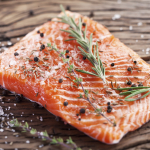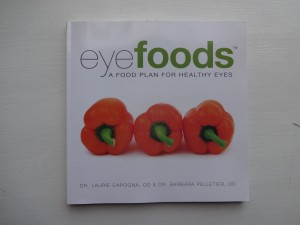[heading centered=”yes” margin_bottom=”no”]Nutrient rich foods can improve eye health[/heading]
A balanced diet is an important foundation to maintain good health, but most Americans don’t know what nutrients are best for their eyes. It is also not widely known that diet can affect your eye health and vision as you age. It’s important to make good lifestyle choices now to help avoid problems later. Enjoy a nutrient-rich diet, stay active and avoid harmful habits such as smoking.
So… what are the best foods for eye health? Most people think carrots are the best, but kale, collard greens, orange peppers and spinach are actually the most nutrient rich food for the eyes.
Green Leafy Vegetables and Eggs are rich in Lutein and Zeaxanthin. Many studies have shown that lutein and zeaxanthin reduce the risk of chronic eye diseases, including cataracts and age-related macular degeneration. Theses plant-based pigments also appear to lower the risk of developing type 2 diabetes, a leading cause of blindness. They are also protective antioxidants that work like internal sunglasses, absorbing damaging blue light.
Fruit and Vegetables are rich in Vitamins A, C and polyphenols. The eye’s light-sensitive retina (thin layer of tissue at the back of the eye) requires adequate vitamin A for proper function. Vitamin C supports the health of ocular blood vessels. Scientific evidence suggest vitamin C lowers the risk of developing cataracts and when taken in combination with other essential nutrients, can slow the progression of macular degeneration and visual acuity loss. Polyphenols are plant-derived substances that reduce inflammation and are especially high in colorful fruits and vegetables.
Nuts, Fortified Cereals and Sweet Potatoes are rich in eye-health Vitamin E. Vitamin E promotes the health of cell membranes and DNA repair and plays a significant role in the immune system. It has also been shown to slow the progression of macular degeneration and visual acuity loss when combined with other essential nutrients.
Salmon, Tuna and other Cold Water Fish contain Omega-3 Fatty Acids.  Omega-3 Fatty Acids may reduce inflammation, enhance tear production and support the eye’s oily outer layer by increasing oil that flows from the meibomian glands. Research has also shown omega-3 fatty acids can play a role in preventing or easing the discomfort of dry eye. Fish oil supplements are often prescribed as part of the Westside Optometry dry eye treatment.
Omega-3 Fatty Acids may reduce inflammation, enhance tear production and support the eye’s oily outer layer by increasing oil that flows from the meibomian glands. Research has also shown omega-3 fatty acids can play a role in preventing or easing the discomfort of dry eye. Fish oil supplements are often prescribed as part of the Westside Optometry dry eye treatment.
The body doesn’t make the nutrients listed above on its own, so they must be replenished daily.
 For more information on Eyefoods check out the book I reviewed last year.
For more information on Eyefoods check out the book I reviewed last year.